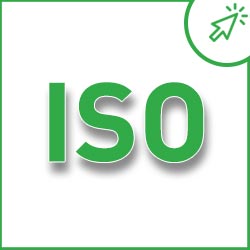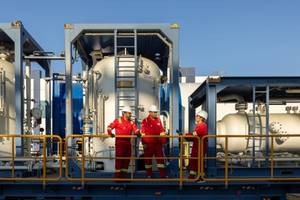Contact us ?
Your challenges
in Management System Certification
Certification, in accordance with internationally recognised management standards, enables your company to adopt a continuous improvement approach.
Management systems put in place frameworks and processes that enable your company to improve its performance, limit risks and adopt a quality approach. Calling on Apave, an independent third party for your certifications, will give you the international recognition you need to develop your projects and meet your customers' requirements :
-
Control costs and increase productivity
By identifying non-conformities, the management system makes it possible not only to correct them but also to prevent them over time.
-
Improve exchanges with stakeholders
By assessing the various stakeholders, you can maintain optimum quality throughout your processes.
-
Satisfy customers
By making your processes transparent to your customers, you can identify at any time what actions need to be taken to correct feedback and meet their expectations.
-
Unite your staff
More than just setting up processes within your company, this is a real project that is meaningful to your employees and involves all your teams.
Certifications issued by Apave
in the Middle East

ISO 14001

ISO 14001
What is ISO 14001?
The ISO 14001 standard is a voluntary international standard that aims to implement an Environmental Management System in companies and organizations of all sizes and in all sectors of activity.
What are the levers involved?
The ISO 14001 standard defines specific requirements for an environmental management system (EMS) that allows an organization to:
- Determine its significant environmental impacts
- Develop an environmental policy
- Establish objectives
- Take into account regulatory requirements
- Establish processes that allow it to respect the commitments expressed in this environmental policy
- Take the necessary actions to improve its environmental performance
Like ISO 9001 and ISO 50001, it is part of the management system standards based on the principle and approach of continuous improvement (of environmental performance for ISO 14001).
What are the modalities?
The validity period of the ISO 14001 : Environmental Management System certification is 3 years, subject to the completion of annual surveillance audits.
The renewal of the certification requires a renewal audit, which is carried out by a different auditor and which aims to confirm that there is no major non-conformity.
The requirements of an EMS are divided into 18 environmental requirements and 6 chapters, including:
- General requirements
- Environmental policy
- Planning
- Implementation of actions to comply with the environmental policy
- Controls and corrective actions
- Management review
What are the benefits of certification?
The implementation of the ISO 14001:2015 standard aims to:
- Control the environmental impact of your activities
- Develop an environmental policy
- Demonstrate your involvement in the preservation and protection of the environment on a global scale.
Benefits for the ISO 14001 certified organization:
- Identification of the environmental aspects of your activities, products and services.
- Reduction of nuisances.
- Compliance with regulatory requirements.
- Transparent communication with employees, local residents, customers, environmental associations, elected officials, insurers...
- Enhancement of your image
- Opening towards new markets
- The certification of your environmental management system (EMS) according to the ISO 14001 standard allows you to prove your environmental involvement on a worldwide level.

ISO 22000

ISO 22000
What is ISO 22000?
ISO 22000 concerns organizations working in agricultural production (plant or animal), processing, packaging, storage, distribution and catering in contact with the public or professionals, in the improvement of their management system.
What are the levers involved?
- Guarantee food safety in the production and value chain
- Maintain the cold chain
- Maintain a high level of hygiene throughout the chain
- Ensure traceability
- Develop a safety culture throughout the chain
By conducting interviews (management, key managers, operators), examining your sites and facilities in operating condition, and reviewing all your documents (procedures).
What are the modalities?
At the end of the service, Apave will provide you with the following deliverables:
- Certification audit report
- A certificate in accordance with the ISO 22000 V2005 standard, after suggestions for correcting any discrepancies identified.
Certification is awarded for 3 years (with an initial/renewal audit and 2 annual surveillance audits).
What are the benefits of certification?
- Higher quality jobs in the food industry
- Improved utilization of resources worldwide
- Increased company profits
- Potential increased economic growth
- Insurance of safer food
- Limit food waste
- Reduction in rates of foodborne disease
- More efficient documentation of techniques, methods and procedures

ISO 27001

ISO 27001
What is ISO 27001?
ISO/CEI 27001:2017 is an information security risk management standard. Certification of conformity to this standard provides assurance to the organization, company or administration that holds it, as to the level of control over the security of the information it handles on its own behalf or on behalf of its customers.
What are the levers involved?
- Confidentiality: Protect confidential information from unauthorized access and prevent unauthorized disclosure.
- Integrity: Ensure the accuracy and integrity of information, preventing unauthorized modification.
- Availability : Guarantee that information is available and accessible to authorized users when required.
- Compliance: Ensure compliance with laws, regulations and other information security requirements.
- Business continuity: Ensure business continuity in the event of a security incident or disaster.
- Risk management: Identify and assess information security risks, then implement control measures to mitigate them.
What are the modalities?
The auditor will examine your risk analysis with you, based on the triptych of Confidentiality, Integrity and Data Availability. The implementation of security measures, the most "practical" aspect of certification, is then audited.
Certificate validity: 3 years, subject to completion of annual surveillance audits.
What are the benefits of certification?
- Reduce the need for frequent audits
- Improve structure
- Comply with business, legal, contractual and regulatory requirements
- Protect and enhance your reputation
- Avoid losses and financial penalties associated with data breaches
- Obtain an independent opinion on your level of security
- Define a clear strategy for information and its protection
- Detect vulnerabilities and address threats,
- Protect your confidential information,
- Mobilize teams around a common project,

ISO 45001

ISO 45001
What is the ISO 45001?
ISO 45001 is an international standard that aims to implement an Occupational Health and Safety (OHS) management system and establish objectives taking into account legal requirements and information on OHS risks.Actively promote the implementation and awareness of integrated QSE (Quality, Safety and Environment) approaches.
What are the levers involved?
- OHS management system planning and policy
- Risk management
- Training and awareness of occupational health and safety risks and prevention and protection measures
- Management's commitment to provide the necessary resources to ensure its effectiveness.
- Continuous improvement of the OHS management system
What are the benefits of certification?
- Manage risks in a global and structured way
- Reduce the number of work accidents of your employees
- Reduce the direct and indirect costs of your organization (business interruptions, insurance premiums...)
- Increase productivity and performance through better working conditions (less absences, lower staff turnover rate...).
- Demonstration of your commitment to improving the health and safety of your employees.
- Improvement of your image with your partners, clients and customers.
What are the modalities?
- That your Occupational Health and Safety management system has been in place for 6 months,
- That your Occupational Health and Safety management system has also been audited internally at least once,
- That a management review has been carried out.

ISO 50001

ISO 50001
What is the ISO 50001 standard?
The ISO 50001 standard is a voluntary international standard that aims to develop and implement a systematic energy management system to focus on energy performance.The certification of your energy management system according to the ISO 50 001 standard allows you to prove that you comply with the energy efficiency policy you have set. This certification request is part of your quality, CSR and environmental policy.
What are the levers involved?
The ISO 50 001 standard defines specific requirements for an energy management system, allowing an organization to:
- Develop and implement a more efficient energy policy
- Establish objectives, targets and action plans to meet the commitments expressed in this policy
- Measure the results of the energy policy based on data
- Take the necessary measures to continuously improve its energy performance.
It contributes to the implementation of a continuous improvement process, which will result in a more efficient use of available energy sources, better competitiveness and a reduction of greenhouse gases. It encourages the implementation of an energy monitoring plan and energy analyses.
What are the benefits of certification?
The implementation of ISO 50 001:2018 aims to:
- Enable organizations to establish the systems and processes necessary to improve energy performance.
- Particularly in relation to energy efficiency, usage and consumption.
- Lead to a decrease in greenhouse gas emissions and energy-related costs.
- Identify potential energy savings.
- Implement an action plan.
- Involve all staff in a unifying project
The certification of your energy management system according to the ISO 50 001 standard allows you to prove that you comply with the energy efficiency policy you have set.
What are the terms and conditions?
The ISO 50 001 certification is valid for 3 years under the conditions of annual surveillance audits. Renewal of the certification requires a renewal audit, which is carried out by a different auditor.
In order to present yourself for certification in the best conditions, to facilitate obtaining it and to better meet the requirements of the ISO 50 001 standard, we recommend
- That your energy management system has been in operation for 6 months
- That it has been audited internally at least once.
- That a management review has been carried out.

ISO 9001

ISO 9001
What is ISO 9001?
The ISO 9001 standard is an international standard that aims to implement a quality management system in companies and organizations of all sizes, in all sectors of activity.
It is the most requested and recognized certification in the world, with more than one million certified. This standard allows to increase the performance and the competitiveness of the company, to satisfy the customers, to involve the collaborators, and to join a long-term quality approach.
What are the levers involved?
It defines specific requirements for the quality management system, based on principles such as :
- Management involvement
- Customer orientation
- Staff involvement
- Process approach, system approach, continuous improvement, evidence-based decision making, and mutually beneficial supplier relationships.
What are the benefits of certification?
It provides proof of the organization's performance in the areas of quality, occupational health and safety and environmental management. The ISO 9001 standard offers many advantages such as :
- Increased customer confidence
- Cost reduction
- Staff involvement
- Progressive approach
- Removal of trade barriers and international recognition
What are the modalities?
he certification is valid for 3 years and to obtain the certification, it is recommended that the quality management system has been in place for at least 6 months, that it has been audited internally at least once, and that a management review has been performed.
Discover our other certifications
Our strengths

OUR CUSTOMER RELATIONSHIP APPROACH

OUR EXPERTISE





